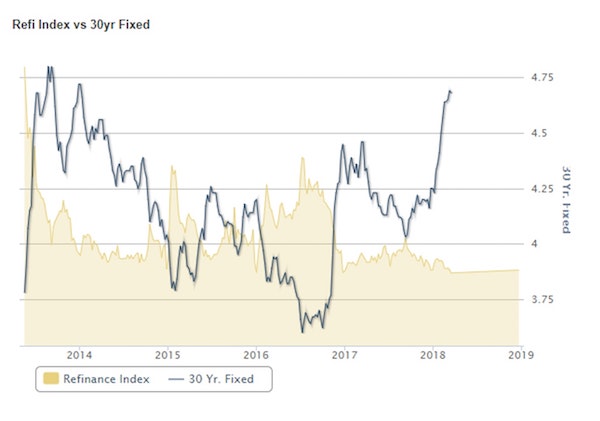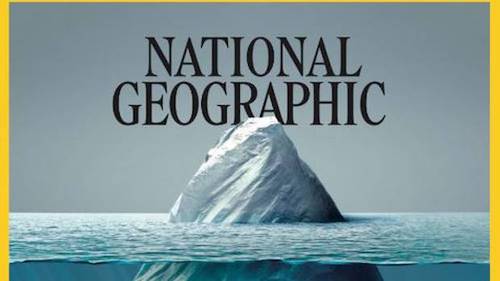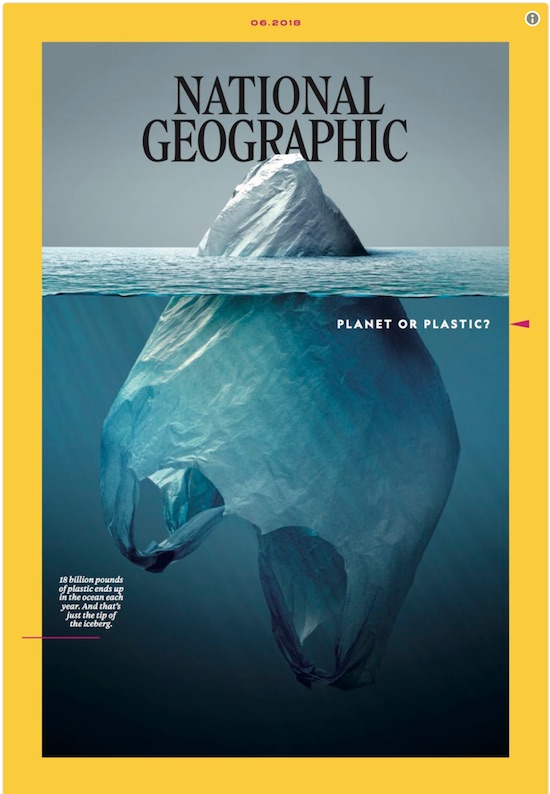
Vincent van Gogh Daubigny’s garden 1890

“People are further and further in debt and need to pull out cash to pay the bills.”
• Housing ATM is Back – But It Won’t Work Any Better This Time (Mish)
With mortgage rates rising, one would expect refi activity to slow. And it has: Refi Applications are at an 8-Year Low. But why is there any refi activity all at all? In September 2017 the MND mortgage rate rate was 3.85%. In June 2016, the MND rate was 3.43%.

It makes little sense to refi at 4.70% when one could have done it less than two years ago a point and a quarter lower. At these rates, refi activity should be in the low single digits. Yet, 36% of mortgage applications are refis.

Are people pulling money out of their houses to pay bills? That’s how it appears as Cash-Out Mortgage Refis are Back. What’s Going On?
• People feel wealthy again and are willing to blow it on consumption
• People pulling money out to invest in stocks or Bitcoin
• People are further and further in debt and need to pull out cash to pay the bills.I suspect point number three is the primary reason. Regardless, releveraging is as wrong now as it was in 2007. Totally wrong.

Dump and dump.
• Will the New Fed Get Rid of All its Mortgage-Backed Securities? (WS)
Like Powell, Clarida said he “absolutely” supports the Fed’s normalization of interest rates and the balance sheet. Like Powell, he said that the normalized balance sheet should be “a lot smaller,” and that Powell’s suggestion of a range of $2.4 trillion to $2.9 trillion, down from its peak-level of $4.5 trillion, “makes sense.” Like Powell, he said stock market volatility itself – that’s downward volatility, the only volatility that matters on Wall Street – shouldn’t determine the Fed’s policy decisions. On banking regulation too he mirrored Powell. So in this sense, what he said about mortgage-backed securities on the Fed’s balance sheet is fascinating: The Fed should shed them entirely, down to zero.
Clarida explained that there are “benefits and costs” of QE, and that as more layers of QE were piled on, “the benefits of QE diminished and the costs went up.” And as vice chairman, he’d “have to take a serious look at the costs of QE.” Then he was asked about “non-Treasury instruments, like mortgage-backed securities,” for QE – that the Fed, when selecting non-Treasury securities, would be getting into something that it shouldn’t, namely “allocating credit.” “Yes, absolutely,” Clarida replied: “My preference would be for the Fed to end up with a Treasury-only portfolio.” He then added that, “as a general proposition, my preference would be to have the balance sheet as much as possible in Treasury securities.”
Shedding MBS from the balance sheet entirely and keeping them off could have a big impact. Currently, the Fed holds $1.74 trillion of MBS. That’s about 26% of all residential mortgage-backed securities outstanding. The Fed is the elephant in the MBS room.

“..the company that 20 years ago, was the second largest in the world..”
• Venezuela’s State Oil Company PDVSA Faces Collapse (PaP)
In less than a month, Venezuela’s state oil company, Petróleos de Venezuela (PDVSA), faces three lawsuits that may end up taking all of the oil giant’s international assets, leaving it bankrupt. According to the economist and opposition congressman, Ángel Alvarado, the company that 20 years ago, was the second largest in the world, is about to disappear. Alvarado says that the state has no way to pay all its outstanding debts or the legal judgments that are looming. In an ominous sign, creditors today attempted to collect USD $2.9 billion that the oil company has failed to pay in debt obligations. The bankrupt company not only must face ConocoPhillips, after having lost a lawsuit where it was ordered to pay the US oil company USD $2 billion.
PDVSA now must also respond to a wave of similar claims, as it looks for a way to pay bondholders after default, and tries to restart refineries that are about to close because of diminished production caused by abandonment and embezzlement. In short, PDVSA faces the perfect storm for falling into bankruptcy, with no credible path for solvency. According to OPEC, Venezuela is the country with the largest proven reserves of crude oil in the world with 296 billion barrels. However, paradoxically, the export of crude oil is not a profitable business for the South American country after years of neglect by the socialist government. Recently the US company ConocoPhillips decided to seize the PDVSA’s assets in the Caribbean, a dangerous precedent that could influence other plaintiffs to take similar measures.

Joining the rest of the world.
• Births Plunge To Record Lows In United States (AFP)
Births in the United States have plunged to record lows not seen in decades, marking a profound cultural shift that could have ramifications for the future economy, experts said Thursday. The overall fertility rate, which essentially shows how many babies women are having in their childbearing years, and indicates whether the population is replenishing itself, fell to 1.76 births per woman last year, down 3% from the rate of 1.82 in 2016. That marks “the lowest total fertility rate since 1978,” said the report by the National Center for Health Statistics, part of the US Centers for Disease Control and Prevention. Meanwhile, the US birth rate plunged to a 30-year low.
The 3.85 million US births in 2017 were the fewest since 1987, as American women under 40 continued to delay childbearing. About 77,000 fewer babies were born last year than in 2016 – about a 2% drop year-on-year. The latest downward trend began around the onset of the global financial crisis in 2007 and 2008, but has not abated even as US jobs rebounded and the economy has improved. “To me the biggest surprise is the continuing decline of fertility rates among young women,” said William Frey, a demographer and senior fellow of the Metropolitan Policy Program at The Brookings Institution. “About 10 years since the Great Recession we still see this declining fertility among women in their 20s and that could be problematic if it continues for another three or four years.”

“The last 30 years in Italy have been characterized by a constant mixture of politics, the mafia and occult affairs that have literally shattered our country to the bone..”
• Open Letter From M5S To The Financial Times (IBDS)
Letter to CEO John Ridding and editors of the Financial Times. Dear Sirs, I have read your article “Rome opens its gates to the modern barbarians” and, with all due respect to an important newspaper like yours, honestly I think you need to better understand what is taking place in Italy. And I suggest you get to know the 5 Star MoVement a little more closely. The last 30 years in Italy have been characterized by a constant mixture of politics, the mafia and occult affairs that have literally shattered our country to the bone, marking every possible negative record in our history. Nowadays, Italy has about 6 million people under the absolute poverty threshold and about 100,000 young people every year expatriating to try their luck elsewhere, often in your country.
All this is the result of barbarians, old barbarians about whom I have never read as many negative things in your editorials as I am reading these days against us. The 5 Star Movement was born in 2009 with a specific aim: to bring the popular will back to the centre of the political debate and the decisions of the central government. In just 9 years we have grown so much that we can now see what we have accomplished, with over 11 million people who trusted us in the last elections. We succeeded by working hard, with our heads down, studying, always struggling to defend Italian citizens. We succeeded with the youngest, most educated and most gender-balanced parliamentary group that the history of Italy has ever seen. Italians have always believed us based on the awareness that everything we have promised or written in a program, has become a reality on the first occasion we have had to make it happen.
In your article you are talking about a contract of government that is difficult to implement and economically unsustainable: what a pity you have not read this contract yet! And this is an offence to professional journalism, also. But there is one thing you are right about. The contract we are writing is challenging and it will not be easy to remedy the damage caused by political barbarians governing our country for the past 30 years. But we are doing our best to restore hope and to give Italians a brighter future. If you want to better understand how we will acccomplish this, I suggest you do not waste time publishing false news created ad-hoc by the Italian media system, get to know the 5 Star Movement and report the truth instead. Good luck!

On the Guardian’s hit pieces yesterday.
• Ecuador’s Ex-President Denounces Treatment of Julian Assange as “Torture” (GG)
Former Ecuadorian President Rafael Correa, in an exclusive interview with The Intercept on Wednesday morning, denounced his country’s current government for blocking Julian Assange from receiving visitors in its embassy in London as a form of “torture” and a violation of Ecuador’s duties to protect Assange’s safety and well-being. Correa said this took place in the context of Ecuador no longer maintaining “normal sovereign relations with the American government — just submission.” Correa also responded to a widely discussed Guardian article yesterday, which claimed that “Ecuador bankrolled a multimillion-dollar spy operation to protect and support Julian Assange in its central London embassy.”
The former president mocked the story as highly “sensationalistic,” accusing The Guardian of seeking to depict routine and modest embassy security measures as something scandalous or unusual. On March 27, Assange’s internet access at the Ecuadorian Embassy in London was cut off by Ecuadorian officials, who also installed jamming devices to prevent Assange from accessing the internet using other means of connection. Assange’s previously active Twitter account has had no activity since then, nor have any journalists been able to communicate with him. All visitors to the embassy have also been denied access to Assange, who was formally made a citizen of Ecuador earlier this year.
[..] Correa continues to believe that asylum for Assange is not only legally valid, but also obligatory. “We don’t agree with everything Assange has done or what he says,” Correa said. “And we never wanted to impede the Swedish investigation. We said all along that he would go to Sweden immediately in exchange for a promise not to extradite him to the U.S., but they would never give that. And we knew they could have questioned him in our embassy, but they refused for years to do so.” The fault for the investigation not proceeding lies, he insists, with the Swedish and British governments.
But now that Assange has asylum, Correa is adamant that the current government is bound by domestic and international law to protect his well-being and safety. Correa was scathing in his denunciation of the treatment Assange is currently receiving, viewing it as a byproduct of Moreno’s inability or unwillingness to have Ecuador act like a sovereign and independent country.

Hopeful.
• New Zealand ‘People’s’ Budget Puts Billions More Into Health And Education (G.)
The first Labour government in close to a decade has pledged to make New Zealand a kind and equitable nation where children thrive, and success is measured not only by the nation’s GDP but by better lives lived by its people. Finance minister Grant Robertson said the Labour coalition government didn’t want to “manage” issues such as child poverty and homelessness – it wanted to end them. Although the 2018 budget was focused on rebuilding vital public services – particularly the health care sector – Robertson said next year’s budget would be the first in the world to measure success by its people’s wellbeing. “We want New Zealand to be a place where everyone has a fair go, and where we show kindness and understanding to each other,” said Robertson.
“These changes are about measuring success differently. Of course a strong economy is important but we must not lose sight of why it is is important. And it is most important to allow all of us to have better lives … the government is placing the wellbeing of people at the centre of all its work. The 2018 budget had been preceded by weeks of cautious rhetoric by the government, which repeated time and again that before embarking on its ambitious social policies such as ending child poverty, tackling climate change and housing every New Zealander, it first had to invest in upgrading public services such as hospitals and schools.
Labour’s first budget was viewed as restrained and fiscally cautious, with Robertson forecasting a NZ$3bn ($2bn) surplus this year, increasing to $7bn in 2020. Prime Minister Jacinda Ardern said her government’s first budget was not focused on the election cycle, but generational improvement in New Zealanders’ lives. “Rebuild what?” said Ardern, defending her government’s budget and rounding on the opposition leader, Simon Bridges. “Well let’s start with New Zealand’s reputation shall we? We are rebuilding a government that thinks about people.” “In 15 or 20 or 30 years’ time I want my child to look back on the history books and judge me and this government favourably, rather than deciding to change their name.”

A sad comedy.
• Lords Inflict 15th Defeat On Theresa May Over EU Withdrawal Bill (G.)
Peers have inflicted a 15th defeat on the government’s key Brexit bill, underlining the acute political challenge Theresa May faces in seeking a deal that both parliament and her warring ministers can live with. The latest amendment, aimed at bolstering environmental protection after Brexit, was carried by 294 to 244 votes on Wednesday. Peers argued that enforcement measures proposed in a consultation document published last week were inadequate and that the environment had been subordinated to housing and economic growth. With her cabinet still deadlocked over customs arrangements, the prime minister must now decide when to bring the legislation back to the House of Commons and seek to undo the changes made by peers.
Martin Callanan, the Conservative leader in the Lords, said: “During the bill’s journey through the House of Lords, some changes have been made that conflict with its purpose or are designed to frustrate the entire exit process, and so we are considering the implications of those decisions.” The backbench pro-Brexit European Research Group, chaired by Jacob Rees-Mogg, wants to see the votes brought forward as soon as possible to scotch the idea that there is a majority against hard Brexit among MPs. They point to a pair of recent Commons victories, over the release of Windrush documents and a , as evidence that the government’s majority is more secure than moderate backbenchers claim.

“Some NATO countries were secretly producing the chemical agent in small quantities..”
• Western Countries Have Known Novichok Formula For Decades – German Media (RT)
A sample of Novichok, the nerve agent allegedly used to poison the Skripals, was obtained by German intelligence back in the 1990s, local media report. The substance has since been studied and produced by NATO countries. Western countries, including the US and the UK, have long been aware of the chemical makeup of the nerve agent known as Novichok, a group of German media outlets reported following a joint investigation. The inquiry, based on anonymous sources, gives new insights into the issue of the nerve agent said to have been used in the poisoning of former double agent Sergei Skripal and his daughter Yulia in Salisbury, UK, in March.
Western governments were able to lay their hands on the formula of what is described as “one of the deadliest chemical weapons ever developed” after the German foreign intelligence service, the BND, obtained a sample of the nerve agent from a Russian defector in the early 1990s. A Russian scientist provided German intelligence with information on the development of Novichok for some time following the collapse of the Soviet Union, the German NDR and WDR broadcasters, as well as Die Zeit and Suedeutsche Zeitung dailies, report, citing unnamed sources within the BND. At some point, the man offered to bring the Germans a sample of the chemical agent in exchange for asylum for him and his family.
A sample was eventually smuggled by the wife of the scientist and sent by the Germans to a Swedish chemical lab, according to the reports. Following the sample analysis, the Swedish experts established the formula of the substance, which they then handed over to Germany. By the order of the then German Chancellor Helmut Kohl, the BND then shared the formula with Berlin’s “closest allies,” including the intelligence services of the US and the UK. Later, the UK, the US and Germany reportedly created a special “working group” tasked with studying the substance, which also included representatives from France, Canada and the Netherlands.
“Some NATO countries were secretly producing the chemical agent in small quantities,” the four media outlets reported, adding that it was allegedly done to develop the necessary countermeasures. However, it remains unclear which particular states were involved in the Novichok production.

Let’s make sure they are protected.
• 31,000 Unaccompanied Minors Applied For Asylum In EU in 2017 (K.)
Some 2,500 unaccompanied minors applied for asylum in Greece last year, around 8% of the total 31,400 child refugees who sought asylum in European Union countries in 2017. Italy received a relatively large chunk of applications for asylum – more than 10,000, or 32% of the total – followed by Germany, with 9,100 applications (29%). The United Kingdom received 2,200 applications (7%), while Austria received 1,400 (4%), Sweden 1,300 and the Netherlands 1,200. The number of child refugees seeking asylum in EU countries in 2017 almost halved compared to the previous year. In 2016 there were 63,200 applications, while there were 95,200 in 2015. However, the total number of applications in the EU last year was still double the annual average of 12,000 between 2008 and 2013.

On the river.
• DR Congo Ebola Outbreak Spreads To Mbandaka City (BBC)
The Ebola outbreak in Congo has spread from the countryside into a city, prompting fears that the disease will be increasingly difficult to control. Health Minister Oly Ilunga Kalenga confirmed a case in Mbandaka, a city of a million people about 130km (80 miles) from the area where the first cases were confirmed earlier this month. The city is a major transportation hub with routes to the capital Kinshasa. Forty-two people have now been infected and 23 people are known to have died. Ebola is a serious infectious illness that causes internal bleeding and often proves fatal. It can spread rapidly through contact with small amounts of bodily fluid and its early flu-like symptoms are not always obvious.
Senior World Health Organization (WHO) official Peter Salama said the outbreak’s shift to a major city meant there was the potential for an “explosive increase” in cases. “This is a major development in the outbreak”. “We have urban Ebola, which is a very different animal from rural Ebola. The potential for an explosive increase in cases is now there.” Mr Salama, the WHO’s Deputy Director-General of Emergency Preparedness and Response, said Mbandaka’s location on the Congo river, widely used for transportation, raised the prospect of Ebola spreading to surrounding countries such as Congo-Brazzaville and the Central African Republic as well as downstream to Kinshasa, a city of 10 million people. “This puts a whole different lens on this outbreak and gives us increased urgency to move very quickly into Mbandaka to stop this new first sign of transmission,” he said.
[..] On Wednesday more than 4,000 doses of an experimental vaccine sent by the WHO arrived in the country with another batch expected soon. The vaccine from pharmaceutical firm Merck is unlicensed but was effective in limited trials during the Ebola outbreak in West Africa. It needs to be stored at a temperature of between -60 and -80 C. Electricity supplies in Congo are unreliable.

Curious.
• Mysterious Return Of Ozone-Destroying CFCs Shocks Scientists (G.)
A sharp and mysterious rise in emissions of a key ozone-destroying chemical has been detected by scientists, despite its production being banned around the world. Unless the culprit is found and stopped, the recovery of the ozone layer, which protects life on Earth from damaging UV radiation, could be delayed by a decade. The source of the new emissions has been tracked to east Asia, but finding a more precise location requires further investigation. CFC chemicals were used in making foams for furniture and buildings, in aerosols and as refrigerants. But they were banned under the global Montreal protocol after the discovery of the ozone hole over Antarctica in the 1980s. Since 2007, there has been essentially zero reported production of CFC-11, the second most damaging of all CFCs.
The rise in CFC-11 was revealed by Stephen Montzka, at the US National Oceanic and Atmospheric Administration (NOAA) in Colorado, and colleagues who monitor chemicals in the atmosphere. “I have been doing this for 27 years and this is the most surprising thing I’ve ever seen,” he said. “I was just shocked by it.” “We are acting as detectives of the atmosphere, trying to understand what is happening and why,” Montzka said. “When things go awry, we raise a flag.” Erik Solheim, head of UN Environment, said: “If these emissions continue unabated, they have the potential to slow down the recovery of the ozone layer. It’s therefore critical that we identify the precise causes of these emissions and take the necessary action.”

Profound.
• Startling National Geographic Cover Photo Captures The Plastic Crisis (NZH)

A haunting cover image on the June issue of National Geographic is circulating online, suggesting the plastic pollution we see is just the tip of the iceberg. Such is the extent of Earth’s mind-boggling plastic problem that scientists recently found a plastic bag in the Mariana Trench — the deepest point in the ocean, sitting nearly 11 kilometres below the surface. The Nat Geo cover image was shared by the magazine’s senior photo editor Vaughn Wallace on Twitter this morning who called it “one for the ages”.
[..] The latest edition of the magazine is dedicated to Earth’s plastic consumption and is filled with striking images and infographs that show the immense scale of plastic pollution plaguing our planet. As a small part of addressing the problem, the magazine has committed to delivering its issues in paper wrappers rather than plastic wrappers moving forward. One million plastic bottles are bought every minute around the globe and most of them end up in landfill where they take a significant time to break down, or in the ocean where they kill marine life.









